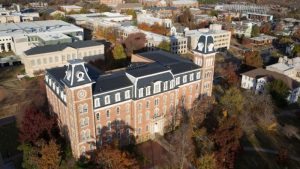The IT workforce at higher education institutions decreased in size during the COVID-19 pandemic, according to a new report from Educause, a nonprofit aimed at improving higher education through IT.
Mairéad Martin has been tapped to be the next chief information officer (CIO) at the University of Illinois Urbana-Champaign (UIUC).
The Federal Communications Commission (FCC) announced it received a whopping $2.8 billion of requests for the remaining $1.5 billion of funding under the agency’s Emergency Connectivity Fund (ECF) program, which aims to close the “homework gap” for students that don’t have access to reliable broadband service and devices.
A new study conducted by Rutgers University showcases how remote learning has put New Jersey lower-income K-12 school districts students and teachers at a disadvantage.
Youngstown State University (YSU), in partnership with the University of Northern Iowa (UNI), has launched a new $10 million tech initiative that aims to create jobs and bolster the manufacturing supply chain.
Code for America announced earlier this week that California, Colorado, Connecticut, and Louisiana “have committed to partnering with the Safety Net Innovation Lab (the Lab) to transform how social safety net services are delivered.”
The Federal Communications Commission on May 17 committed another $50 million to the Emergency Connectivity Funding (ECF) program to help schools expand broadband access and purchase of devices for students – moves that the agency hopes will help close the “homework gap” for students that don’t have access to reliable broadband service and devices.
Is Wi-Fi service coming to a school bus near you? The answer to that question may be a resounding yes, if Federal Communications Commission (FCC) Chairwoman Jessica Rosenworcel has anything to say about it.
The University of Maryland (UMD) has opened the $67 million E.A. Fernandez IDEA (Innovate, Design, and Engineer for America) Factory to foster technology innovations and advances with a new 60,000-square-foot building for its A. James Clark School of Engineering.
The University of Arkansas (UA) System has hired Eric Wall as its first-ever chief information security officer (CISO) – a newly created position that oversees IT security efforts across all 22 campuses, divisions, and units within the system.













